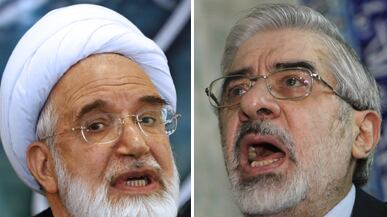There was another day of protests across Iran Tuesday, following the arrests of two main opposition leaders Mir Hossein Mousavi and Mehdi Karroubi, leading experts to say if the government had any doubts that the Green movement was alive despite serious crackdowns—including a rash of executions and arrests—they should be gone.

Starting last Thursday, the two dissident leaders and their wives, Fatemeh Karroubi and Zahra Rahnavard, were cut off from the outside world for two days.
“As a first step, their communications, including comings and goings and telephone contact has been limited, and if need be, other steps will be taken," warned a spokesman for the Iranian Judiciary by Monday.
The same day, opposition web site, Kaleme, announced Karroubi, Mousavi and their wives, had been transferred to Heshmatieh Prison in eastern Tehran. But the semi-official Fars News Agency, which is affiliated with the Islamic Revolutionary Guard Corps (IRGC), denied news of the two leaders' imprisonment, and said they remained inside their homes.
Their alleged jailing represents the biggest ever rift among high-ranking Iranian officials since the 1979 revolution. Mousavi was Iran’s prime minister for 8 years. Karroubi was Speaker of Parliament. Both were very close allies to Ayatollah Khomeini, the father of the Islamic Republic. And now they’re most probably in jail, though no one knows their whereabouts for sure. As Georg Buchner, the German philosopher said, “Revolution is like Saturn, it devours its own children.”
If the regime gives in to social and political demands, it may stand a chance of staying in power.
By arresting the leaders, it seems that authorities thought it would be worth revealing a serious division in government in order to stop street protests. It's hard to tell what will become of such a bold act, but it will surely deepen the divide amongst different factions, especially since Mousavi and Karroubi have sizable support within the establishment.
Authorities were definitely shaken when protesters came out in droves in February, despite over a year of severe crackdowns that nearly silenced the opposition.
And protesters came out again Tuesday, though in smaller numbers, according to eyewitnesses. The government again jammed satellite signals which would enable Iranians to watch satellite television programs.
"People are shocked. It's like the day after the election last year. The satellite programs have been disconnected, but many still don't know it,” Atousa, a young woman who has attended all the major street protests told the Daily Beast. “During the past two weeks, the police attacked people's homes and confiscated their satellite dishes. The police stormed my aunt's house three days ago and took away their satellite dishes from the roof.”
A former Iranian government authority said that if Mousavi and Karroubi’s arrests are not met with major public protests, there is a good chance that a new wave of arrests will follow.
"It is feared that security forces would start arresting, threatening, or intimidating family members of dissident leaders in order to put them under pressure. Right now, one of Karroubi's sons has been arrested and they are pursuing his other son, Hossein. Mir Hossein Mousavi has two daughters, Zahra and Narges, who are in severe danger," he said.
The arrests of high-profile dissidents are a recurring theme for the Islamic Republic. After exposing these individuals to psychological and physical torture, they are made to "confess" to whatever the government is stating as its official position, before television cameras. Many are worried that security authorities will soon do just that to Mousavi and Karoubi.
Extracting confessions is used to appease supporters, insult the opposition, and create division among them. Considering the record of the two dissident leaders inside the top ranks of the Iranian government, however, it is not clear whether security organizations would choose this methodology or not.
"Those who have stood in line against the Revolution must see the punishment for their actions," emphasized Tehran Prosecutor, Mahmoud Jafari Dolatabadi, who was just added to the list of human rights violators directly sanctioned by the US. Dolatabadi's statement is particularly ironic, as the two referenced individuals are two of the most prominent figures of Iran's Islamic Revolution.
A student activist said that people had taken to their roofs on Monday night, chanting Allah-o-Akbar in the dark, as one of the few things they can do to protest the government these days. "People's reaction will be intense whether Mousavi and Karroubi are imprisoned inside a "safe house," or inside the Heshmatieh Prison. The chants of Allah-o-Akbar were very strong tonight in Tehran and some other cities; in some Tehran neighborhoods, we had seldom observed such widespread chants for the past two years. This all shows how much the people are protesting," he said.
He went on to say that the regime must decide if it is worth it to give in to the demands of the protesters, even gradually, in order to save the regime.
A university professor, who spoke on the condition of anonymity, agreed. If the regime gives in to social and political demands, it may stand a chance of staying in power. But if it whips back at protesters with a vengeance, they may unite towards overthrowing the regime, rather than simply demanding reform.
"There has been evidence during the recent week that certain segments of the regime have grown doubtful, and it is clear that at the top of the regime, they have not yet been able to make a final decision. But the next few weeks will definitely show us which route the Islamic Republic has chosen," he said.
"I am very hopeful that the fate of the oppressive dictators of the region, and the experience of the failed crackdown policy of the recent two years in Iran, would lead the heads of the Islamic Republic to the conclusion that they must stop being stubborn and to give in to people's demands and political and social reform. If this does not happen, the main slogan would definitely shift to one of 'regime overthrow,'" he added.
Omid Memarian is columnist whose writing has appeared in The New York Times, The Los Angeles Times, The San Francisco Chronicle and other publications. He was a World Peace Fellow at the UC Berkeley Graduate School of Journalism in 2007-2009 and the 2005 recipient of the 'Human Rights Defender Award', the highest honor bestowed by Human Rights Watch.






